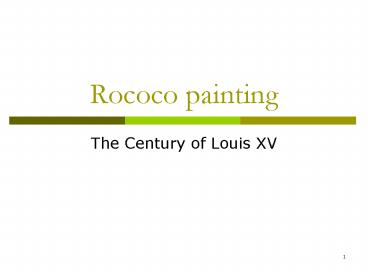Rococo painting - PowerPoint PPT Presentation
1 / 15
Title:
Rococo painting
Description:
... his reputation suffered with the Revolution and the growth of Neoclassicism ... Rococo was eventually replaced by Neoclassicism, which was the popular style of ... – PowerPoint PPT presentation
Number of Views:371
Avg rating:3.0/5.0
Title: Rococo painting
1
Rococo painting
- The Century of Louis XV
2
The Marquise de Pompadour became the mistress of
Louis XV, king of France, in 1745. François
Boucher painted this portrait, which hangs in the
Louvre museum in Paris, France
3
Outline
- Introduction
- Part I. The 18th century in France
- Part II. Definition of Rococo
- Part III. Rococo painters
- Conclusion
- References
4
Introduction
- Rococo art, which flourished in France and
Germany in the early 18th century, was in many
respects a continuation of the baroque,
particularly in the use of light and shadow and
compositional movement - Rejected the traditional themes of heroes and
mythology and instead focused on representing the
carefree life characteristic of the aristocratic
patrons of the arts - This style received its name in the nineteenth
century from French émigrés, who used the word to
designate in whimsical fashion the old shellwork
style (style rocaille), then regarded as Old
Frankish
5
Part I. The 18th century in France
- The Rococo style succeeded Baroque Art in Europe.
It was centered in France, associated with the
reign of Louis XV - Louis XV (1710-74), king of France (1715-74),
whose failure to provide strong leadership and
badly needed reforms contributed to the crisis
that brought on the French Revolution - Pompadour, Marquise de, née Jeanne Antoinette
Poisson (1721-64), influential mistress of Louis
XV, king of France, known for her patronage of
art and literature - In 1745 French population 25 million 28 million
in 1789 - Emergence of the intellectual movement called the
Enlightenment
6
Part II. Definition of Rococo
- An eighteenth century art style which placed
emphasis on portraying the carefree life of the
aristocracy rather than on grand heroes or pious
martyrs - Love and romance were considered to be better
subjects for art than historical or religious
subjects - The style was characterized by a free, graceful
movement a playful use of line and delicate
colors - Genre painting came back into favor when the
Academy admitted Watteau to its ranks in 1717 on
the presentation of this work, the subject of
which was so novel that the term "fête galante"
was coined to describe it
7
Part III. Rococo painters
- Among rococo painters, Jean-Antoine Watteau is
known for his ethereal pictures of elegantly
dressed lovers disporting themselves at fêtes
galantes (fashionable outdoor gatherings) - Highly popular also were mythological and
pastoral scenes, including lighthearted and
graceful depictions of women, by Fragonard and
Chardin
8
a. Watteau
- Watteau, Jean-Antoine (1684-1721), French
painter, who is regarded as one of the
outstanding artists of the rococo period - Born at Valenciennes, which had passed to France
from the Spanish Netherlands only six years
before his birth - Moved to Paris in 1702, worked with Gillot, who
stimulated his interest in theatrical costume and
scenes from daily life - In 1717 he submitted The Pilgrimage to the Island
of Cythera (Louvre, Paris), as his reception
piece to the Academy - Watteau had many loyal friends and supporters who
recognized his genius, and although his
reputation suffered with the Revolution and the
growth of Neoclassicism
9
This picture was Watteau's diploma piece for the
Académie royal de Peinture et de Sculpture.
Watteau's nomination was accepted by the Académie
in 1712. the general atmosphere of the painting
is Venetian, and the distant mountains in their
blue haze recall Leonardo
The Pilgrimage to the Island of Cythera
10
b. Fragonard
- Fragonard, Jean-Honoré (1732-1806), French
painter of the rococo age, became a favorite in
the courts of Louis XV and Louis XVI - His most familiar works, such as The Swing (c.
1766), are characterized by delicate hedonism - François Boucher was prevailed upon to accept him
as a pupil - In 1752, Fragonard's elementary training
completed, Boucher recommended that he compete
for a Prix de Rome scholarship, which meant study
under Carle Van Loo, in Paris - In 1756, Fragonard set off with other scholarship
winners for the French Academy at Rome - A prodigiously active artist, he produced more
than 550 paintings, several thousand drawings
(although many hundreds are known to be lost),
and 35 etchings. His style, based primarily on
that of Rubens, was rapid, vigorous, and fluent,
never tight or fussy
11
The Swing
1767Oil on canvas, 81 x 64 cmWallace
Collection, London
12
c. Chardin
- Chardin, Jean Baptiste Siméon (1699-1779), French
painter, one of the greatest of the 18th century - Embodies the frivolity and elegant superficiality
of French court life at the middle of the 18th
century - In 1727-31 he was in Italy, and on his return was
soon busy as a versatile fashionable artist - Director of the Gobelins factory in 1755 and
Director of the Academy and King's Painter in
1765 - Favourite artist of Louis XV's most famous
mistress, Mme de Pompadour, to whom he gave
lessons and whose portrait he painted several
times
13
Winter (1735 Frick Collection, New York )
14
Conclusion
- It was a reaction of nobility against classical
baroque which had been imposed at Versailles by
Louis XIV - Style of the aristocracy it revealed a taste for
what is clear and elegant, refined and gallant - Life without worry, closely related to nature
- Its influence on French architecture is limited,
yet it reaches Germany where it finds favorable
ground - The 1789 French Revolution interrupted the
development of Rococo - Rococo was eventually replaced by Neoclassicism,
which was the popular style of the American and
French revolutions
15
References
- http//www.kfki.hu/arthp/html/w/watteau/antoine/1
/index.html - http//www.artlex.com/ArtLex/r/rococo.html
- http//witcombe.sbc.edu/ARTH18thcentury.html
- http//www.abcgallery.com/movemind.htmlRococo
- http//www.ibiblio.org/wm/paint/auth/fragonard/
- http//www.zeroland.co.nz/art_periods.html
- http//www.artcyclopedia.com/history/rococo.html































